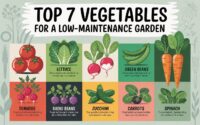Organic vs. Chemical Fertilizers: What’s Best for Your Garden?
Published: 2025-10-19
Introduction: Why Fertilizer Choice Matters
In every thriving garden, fertilizer plays a vital role. Whether vegetables are grown for personal use or flowers are cultivated for beauty, nutrients must be supplied consistently. However, the debate between organic fertilizers and chemical fertilizers continues to divide gardeners. While both types serve the same purpose, their long-term effects on soil, plants and the environment differ significantly.
Therefore, understanding the pros and cons of each fertilizer type is essential. Not only does this knowledge help improve crop yield but it also supports sustainable gardening practices. In this guide, a detailed comparison will be provided to help you choose the best fertilizer for your garden.
What Are Organic Fertilizers?
- Organic fertilizers are derived from natural sources.
- These include compost, manure, bone meal and plant-based materials. Because they are minimally processed, they retain beneficial microorganisms and organic matter.
- As a result, soil structure is improved and long-term fertility is enhanced.
- Moreover, organic fertilizers release nutrients slowly.
- This gradual release ensures that plants absorb nutrients over time. Consequently, nutrient leaching is reduced and soil health is preserved.
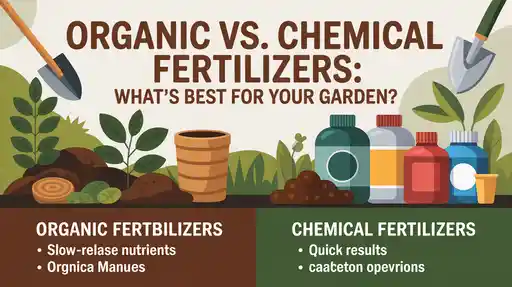
What Are Chemical Fertilizers?
Chemical fertilizers are synthetically manufactured. They contain concentrated nutrients such as nitrogen, phosphorus and potassium. These nutrients are delivered quickly to plants, which often results in rapid growth.
However, chemical fertilizers lack organic matter. Therefore, they do not improve soil structure. In fact, prolonged use may degrade soil quality. Additionally, runoff from chemical fertilizers can pollute nearby water sources.
Despite these drawbacks, chemical fertilizers remain popular due to their immediate results. For gardeners seeking fast growth and high yields, they are often chosen.
Organic fertilizers contain a wide range of nutrients. These include micronutrients and beneficial microbes. Because they are derived from natural materials, their composition varies. However, this variability supports biodiversity in the soil.
On the other hand, chemical fertilizers offer precise nutrient ratios. For example, a 10-10-10 fertilizer contains equal parts nitrogen, phosphorus and potassium. This precision allows gardeners to target specific deficiencies.
Although chemical fertilizers provide exact nutrients, they may lack trace elements. In contrast, organic fertilizers offer a broader spectrum of nutrients, which supports overall plant health.
Environmental Impact of Fertilizer Use
Organic fertilizers are considered eco-friendly. Since they are biodegradable and sourced naturally, they pose minimal risk to the environment. Furthermore, they support carbon sequestration and reduce greenhouse gas emissions.
Chemical fertilizers, however, contribute to environmental degradation. When overused, they lead to nutrient runoff. This runoff causes algal blooms in water bodies and disrupts aquatic ecosystems.
Therefore, gardeners who prioritize sustainability often prefer organic fertilizers. Not only do they nourish plants but they also protect the planet.
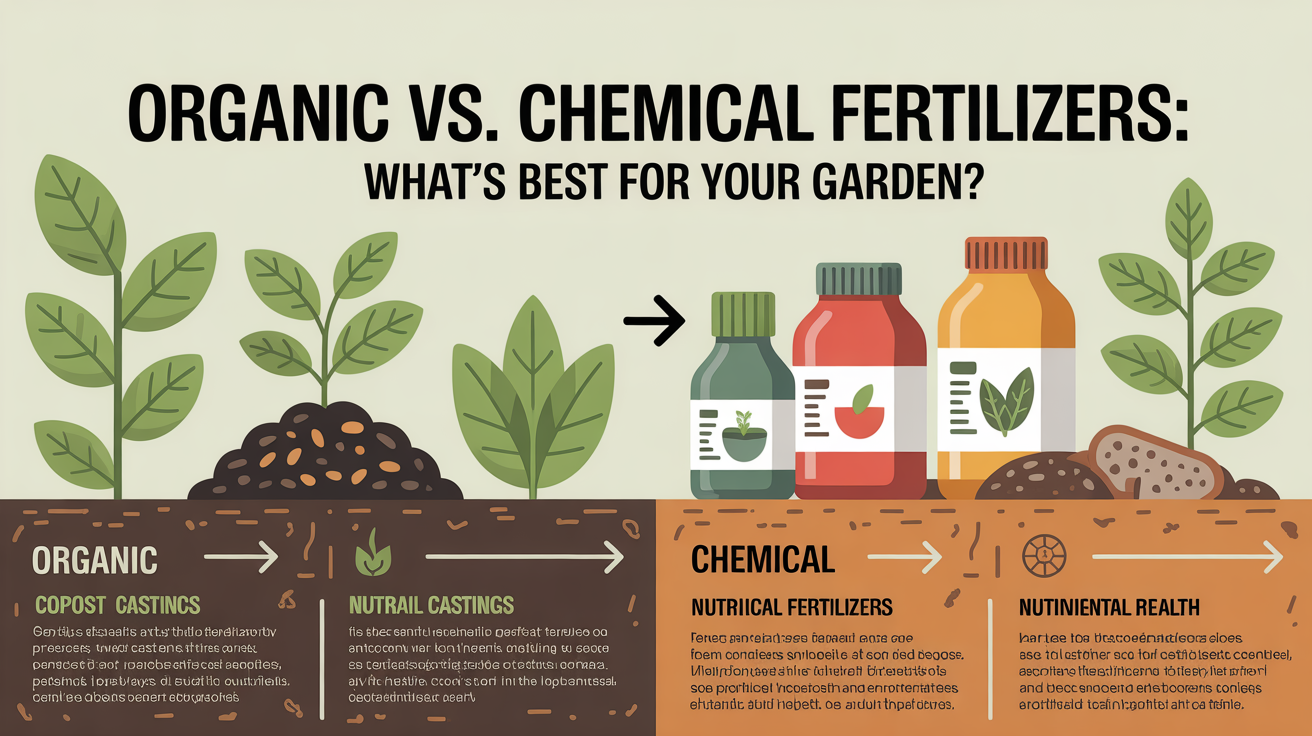
Soil Health and Microbial Activity
Soil health is crucial for long-term gardening success. Organic fertilizers enhance soil structure and increase microbial activity. As organic matter decomposes, beneficial bacteria and fungi thrive. These microbes improve nutrient cycling and plant resilience.
In contrast, chemical fertilizers may harm soil organisms. High salt concentrations can disrupt microbial balance. Over time, soil compaction and reduced fertility may occur.
Thus, for gardeners focused on soil regeneration, organic fertilizers are recommended. Their use promotes a living soil ecosystem that supports healthy plants.
Organic fertilizers are usually applied during soil preparation. Compost and manure are mixed into the soil before planting. Liquid organic fertilizers, such as fish emulsion, can be used during the growing season.
Chemical fertilizers are often applied in granular or liquid form. They are used at specific growth stages to boost performance. However, timing must be precise. Overapplication can burn plants and waste nutrients.
Because organic fertilizers release nutrients slowly, they are more forgiving. Chemical fertilizers require careful monitoring to avoid damage.
Cost Comparison: Organic vs Chemical
Organic fertilizers can be more expensive initially. Composting at home reduces costs but requires time and effort. Commercial organic products may cost more due to sourcing and processing.
Chemical fertilizers are generally cheaper. Their production is industrialized and ingredients are readily available. However, long-term costs may increase due to soil degradation and environmental harm.
Therefore, while chemical fertilizers offer short-term savings, organic fertilizers provide long-term value.
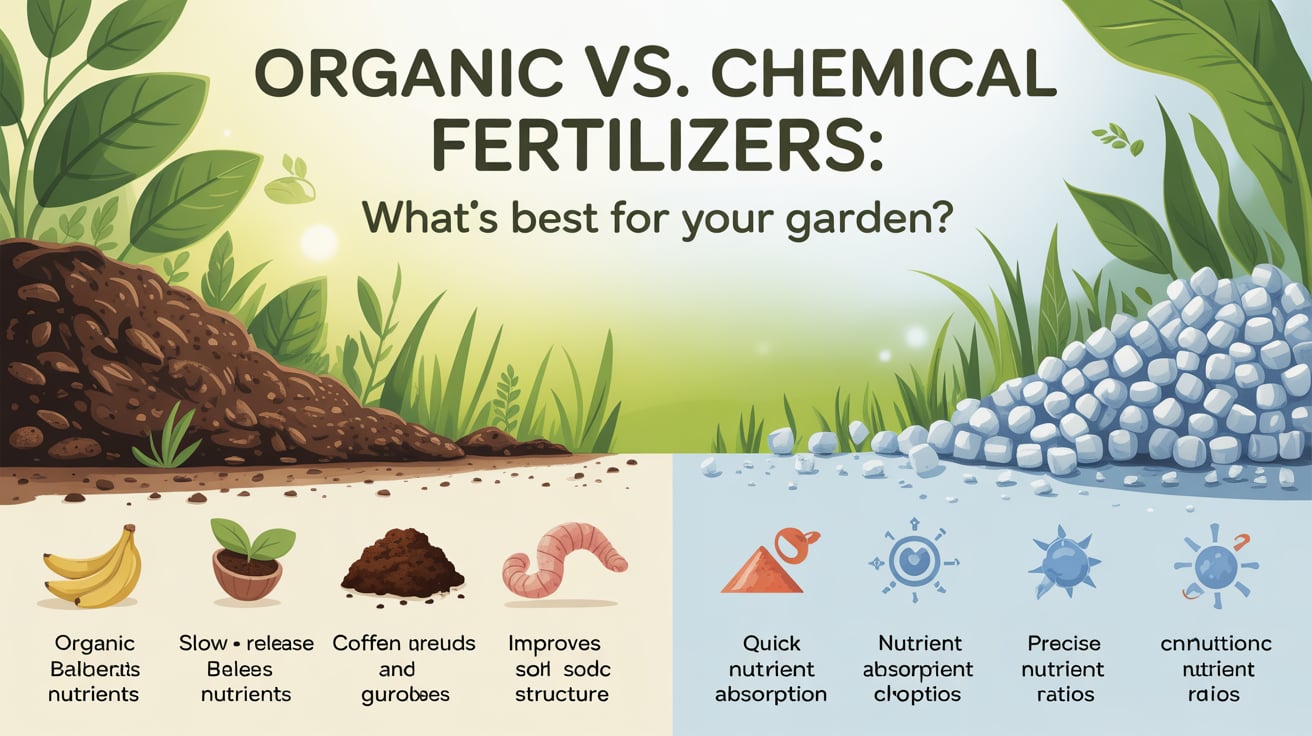
Best Fertilizer for Vegetable Gardens
Vegetable gardens benefit from balanced nutrition. Organic fertilizers improve soil health and support root development. Compost, worm castings and seaweed extracts are ideal for vegetables.
Chemical fertilizers can boost yield quickly. However, taste and nutritional quality may be affected. Studies suggest that organically grown vegetables contain higher antioxidant levels.
For gardeners focused on flavor and nutrition, organic fertilizers are preferred. Chemical fertilizers may be used sparingly to address deficiencies.
Fertilizer Choice for Flower Gardens
Flower gardens require vibrant blooms and strong stems. Organic fertilizers promote gradual growth and long-lasting flowers. Bone meal and compost tea are popular choices.
- Chemical fertilizers enhance bloom size and color rapidly. However, excessive use may lead to weak stems and short-lived flowers.
- A combination of both types may be used. Organic fertilizers build soil health while chemical fertilizers provide quick boosts.
Fertilizer Use Based on Soil Type
- Sandy soils benefit from organic fertilizers. These soils drain quickly and lose nutrients. Organic matter improves water retention and nutrient holding capacity.
- Clay soils may respond well to chemical fertilizers. Nutrients are held tightly and slow-release formulas work effectively.
- Loamy soils are ideal for both types. Organic fertilizers maintain structure and chemical fertilizers enhance productivity.
- Therefore, soil testing is recommended before choosing a fertilizer. Understanding soil composition helps optimize results.
Organic Fertilizer Types and Benefits
- Compost: Improves soil texture and adds nutrients
- Manure: Rich in nitrogen and enhances microbial activity
- Bone Meal: Provides phosphorus for root growth
- Fish Emulsion: Delivers quick nitrogen boost
- Seaweed Extract: Supplies micronutrients and growth hormones
Each type serves a specific purpose. When used together, they create a balanced nutrient profile.
Chemical Fertilizer Types and Uses
- Nitrogen Fertilizers: Promote leafy growth
- Phosphorus Fertilizers: Support root development
- Potassium Fertilizers: Enhance disease resistance
- Complete NPK Fertilizers: Provide balanced nutrition
These fertilizers are used based on plant needs. Precision is key to avoid overfeeding.
Transitioning from Chemical to Organic
Switching to organic fertilizers requires patience. Soil may take time to adjust. Initial yields may be lower but long-term benefits are significant.
Start by incorporating compost and reducing chemical use. Gradually introduce organic teas and amendments. Monitor plant response and adjust accordingly.
This transition supports sustainable gardening and improves soil health.
Common Myths About Fertilizers
- Myth: Organic fertilizers are weak
- Truth: They build long-term fertility
- Myth: Chemical fertilizers are always harmful
- Truth: When used correctly, they can be effective
- Myth: Organic gardening is expensive
- Truth: Home composting reduces costs
Understanding these myths helps gardeners make informed decisions.
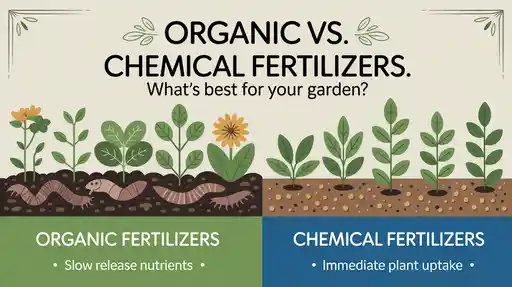
Tips for Fertilizer Success
- Test soil before application
- Follow recommended dosage
- Combine organic and chemical methods if needed
- Observe plant response regularly
- Adjust based on weather and growth stage
These tips ensure optimal results and prevent nutrient waste.
FAQs: Quick Answers for Gardeners
Compost is ideal due to its ease of use and soil benefits.
Yes if overused or applied incorrectly.
Most are safe but bone meal should be kept away from dogs.
Organic fertilizers are applied seasonally while chemical ones may be used monthly.
Compost improves soil health while synthetic fertilizer boosts growth quickly.
Conclusion: Choosing What’s Best for Your Garden
Ultimately, the choice between organic and chemical fertilizers depends on your gardening goals. If sustainability and soil health are prioritized, organic fertilizers are recommended.
For quick results and targeted nutrition, chemical fertilizers may be used carefully.
By understanding the strengths and limitations of each type, gardeners can make informed decisions. Whether vegetables are grown for nutrition or flowers are cultivated for beauty, fertilizer choice matters.
A balanced approach often works best. Combining organic matter with occasional chemical support ensures healthy plants and thriving soil. With proper care and knowledge, your garden will flourish season after season.

- Be Respectful
- Stay Relevant
- Stay Positive
- True Feedback
- Encourage Discussion
- Avoid Spamming
- No Fake News
- Don't Copy-Paste
- No Personal Attacks



- Be Respectful
- Stay Relevant
- Stay Positive
- True Feedback
- Encourage Discussion
- Avoid Spamming
- No Fake News
- Don't Copy-Paste
- No Personal Attacks


